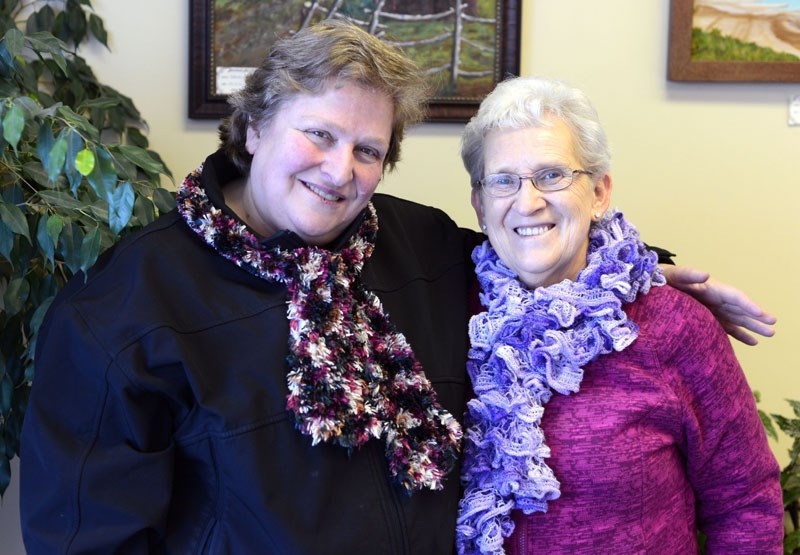Due to the COMPASS program’s confidentiality, some names have been omitted at the request of the individuals.
Caregiver: an individual who provides care for a family or friend who is living with challenges due to disability, illness or old age.
Being a caregiver can be stressful. It can be isolating. It can have a negative impact on your mental and physical health. It is also a load that doesn’t have to be carried alone.
For the second time, caregivers in Barrhead have the opportunity to participate in Caregiver Orientation for Mobilizing Personal Assets and Strengths for Self-care (COMPASS) program, which has a tentative start date of Feb. 18.
The workshop provides a safe environment to help caregivers reduce stress, lessen guilt, and get the most out of the system. Most importantly, it teaches caregivers how to take a step back and care for themselves.
Spending time in a group with those in the same shoes, participants gain an understanding of their journey and learn how to make the road they travel a little easier.
Even COMPASS facilitators have been caregivers themselves, including Barrhead’s facilitator Susan Oleskiw. In addition to working in healthcare, Oleskiw was a caregiver in her own home for 19 years.
Without enough registration however, the program is in danger of cancellation. The workshop ideally needs eight to 10 participants in order to go ahead, and currently there are only four people signed up.
Some women who completed Barrhead’s first COMPASS workshop last spring are eager to encourage fellow caregivers to consider the program. Several of them still meet once a month in a caregiver support group.
Shirley Williams, who cares for two family members, is one of them. She urges any caregiver to consider COMPASS because what she learned from the class, and really loved, was that she wasn’t alone.
“To hear everybody else was in the same boat, it was good to understand that you’re not alone and that there is help,” she said. “At least we can talk about it and connect with resources. Care for each other.”
Williams said the class taught her about self care, perspective, finding balance between caring for another person and taking care of yourself, and planning for the situation of each individual.
“It gives you the perspective to manage things well. That in itself is a sense of peace, because otherwise it can be all-consuming,” said Williams. “It gives you perspective, it gives you hope, it gives you encouragement, support.”
When you have those things, said Williams, you empowered to carry on. The learning process also helps you realize what to let go of, and what to continue with, she said.
Many in the class felt the atmosphere was one of trust. There is a lot of support in a group like COMPASS, said one woman who found it hard to talk to people outside the class.
“You don’t want to talk to everybody and tell them all your problems because they don’t really understand. Someone who has been there and is going through it, they know what you mean,” she said “You know you’re not alone. There is a lot of help you can get if you reach out for it. “
The Barrhead area woman, who is the caregiver for a family member, said she would recommend the class as it helps prevent burnout. The program really emphasizes that caregivers need to take care of themselves too, she said.
“We’re so busy looking after somebody else, but we need to remember to take care of ourselves so we have something to give,” she said.
Elaine Toma, who is the caregiver for her husband, said the group really helped her work through the days that seemed overwhelming. She found when she got together with others in the same boat, her problems didn’t appear impossible anymore.
“You feel so much better when you leave the group,” said Toma. “Once you go back home you can cope with your problems. You can face them.”
Toma said COMPASS allowed her to come to terms with heavy weight of guilt she was feeling as a caregiver. Before the classes, leaving the house to do something for herself would weigh on her conscience.
“Before we started I would feel guilty. If I was going to go out and meet the ladies, and I’m leaving him at home,” said Toma. “But now I say no, I need this time for myself. This helped me to cope with that.”
A woman whose husband suffers from dementia caused by strokes said she didn’t realize the burden of caregiving until she participated in COMPASS. During the classes, she found herself surrounded by others in similar situations.
“At first I could hardly open my mouth. It was kind of overwhelming,” she said. “To meet all these people that had basically the same problems, and learning how to deal with mine, it has been wonderful for me.”
The Barrhead woman said she also found the confidentiality aspect of the group quite relieving.
“Even after the first meeting I found that I was looking forward to it because I was learning so much, and being able to open up more,” she said. “To be with people where I can speak and they understand.”
Although her husband now resides in the Barrhead Continuing Care Centre, the benefits of COMPASS still linger. He wants her to visit every day, she said. However if she doesn’t feel up to going, she is now in a place where she can take time for herself.
“When he was at home I had to be there regardless. Now if I don’t feel well that day I’m not going to go,” she said. “I find when I go to see him, I’m more relaxed. Not on edge all the time.”
The cost of the workshop is $40. To register or get more information call FCSS at 780-674-3341, or contact the Alberta Caregivers Association at 780-453-5088.
More information is also available online at www.albertacaregivers.org.



